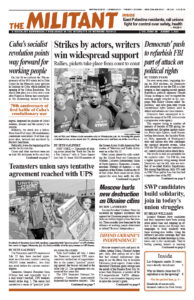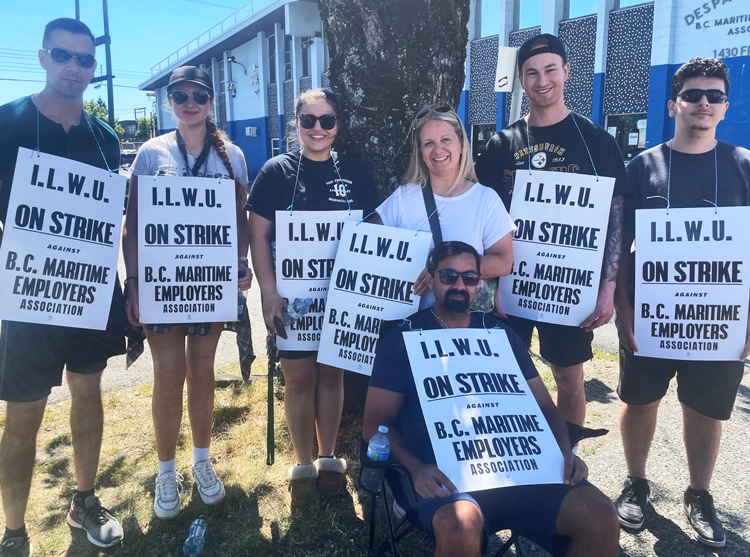MONTREAL — Under threats by the federal government in Ottawa to consider “all options” to force an end to a strike by 7,400 British Columbia dockworkers at West Coast port facilities, the International Longshore and Warehouse Canada union’s Contract Caucus voted July 21 to recommend dockworkers vote to accept contract terms drawn up by a government mediator. The bosses have already said they will sign it.
The longshore workers will discuss the proposed contact at “stop-work meetings” July 25, and then vote July 27-28.
The Contract Caucus, comprised of 100 elected union members, reversed a decision it took July 18 rejecting the mediator’s recommendations, which had led to workers walking out for the second time after a 13-day strike July 1-13.
The workers have been demanding a two-year contract, with wage increases to cover inflation and job protection from the BC Maritime Employers Association’s drive to contract out more union jobs and increase use of automation technology.
The mediator’s report proposed a four-year contract with a compounded wage increase of 19.2%.
Before the Contract Caucus reversed its vote, ILWU Canada President Rob Ashton had said the union “does not believe that the [mediator’s] recommendation had the ability to protect our jobs, now or into the future,” and the “employers have not addressed the cost-of-living issues that our workers have faced over the last couple of years as all workers have.”
Five of the biggest companies represented by the BC Maritime Employers Association reported $103.3 billion in profits last year.
Bosses’ associations across the country — including the BCMEA, Canadian Chamber of Commerce, Retail Council of Canada and the Canadian Manufacturers and Exporters — called on Prime Minister Justin Trudeau to reconvene Parliament from its summer recess to pass “back to work” legislation to force an end to any strike. They were backed by a massive anti-strike campaign in the capitalist media.
“If the federal government does step in to legislate us, or any other worker for that matter, there is no need for any employer to negotiate with workers,” Ashton said. “That can’t be allowed to happen in this country.”
Threat of state intervention
Following the resumption of the strike, the supposedly “independent” Canada Industrial Relations Board, whose members are appointed by the federal government, ruled it was “unlawful,” using the manufactured excuse that the union had not given 72 hours’ strike notice. They ordered the workers back to work.
The board ruling was followed by a behind-closed-doors meeting of Ottawa’s Incident Response Group, a group of cabinet ministers and senior government officials that have dealt with past situations the federal government considered to be a national emergency.
“Introducing the Emergencies Act sets a precedent that could be used against the labour movement when it holds protests in the future,” said a press release by the executive board of the Ontario Public Service Employees Union. “Historically, the labour movement has often been the target of legislation aimed at suppressing anti-government dissent, including times when workers have demanded better living conditions through strike actions.”
“The threats by Prime Minister Trudeau and his ministers to consider ‘all options’ to declare the longshore strike illegal and use the repressive force of the capitalist state against the strikers and their union should be opposed by all working people and the entire labor movement,” Steve Penner, organizer of the Communist League, told the Militant July 20.
“Working-class solidarity and union power can prevent the rulers from using laws like this against working people and our unions. That’s the lesson of the victorious struggle of the 55,000 Ontario education workers, members of the Canadian Union of Public Employees,” he said. In November 2022, with the backing of the entire labor movement, they defied the Ontario government’s anti-strike Bill 28, forcing its repeal.
“Thousands of workers have seen the lengths the bosses and their parties will take to assure their profits,” Penner said. “That’s why the B.C. longshore workers won such wide solidarity, including from unions in the U.S., Australia, New Zealand and elsewhere.
“This can help lay the basis for workers seeing the need to break with the bosses’ parties and forge a labor party based on the unions to fight to take political power.”


